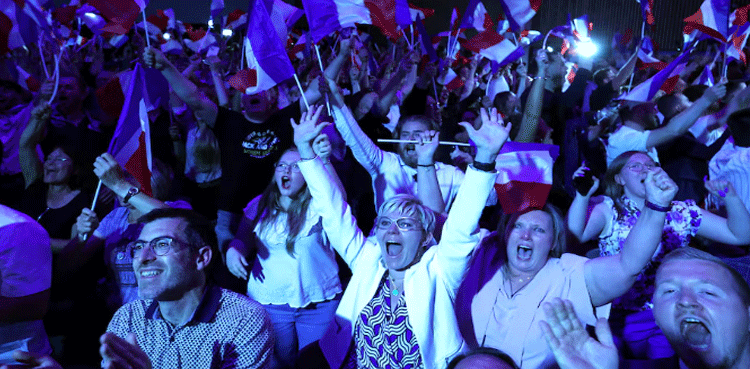
Marine Le Pen’s far-right National Rally (RN) party scored historic gains to win the first round of France’s parliamentary election on Sunday, exit polls showed, but the final result will depend on days of horsetrading before next week’s run-off.
The RN was seen winning around 34% of the vote, exit polls from Ipsos, Ifop, OpinionWay and Elabe showed, in a huge setback for President Emmanuel Macron who had called the snap election after his ticket was trounced by the RN in European Parliament elections earlier this month.
The RN’s share of the vote was comfortably ahead of leftist and centrist rivals, including Macron’s Together alliance, whose bloc was seen winning 20.5%-23%. The New Popular Front (NFP), a hastily assembled left-wing coalition, was projected to win around 29% of the vote, the exit polls showed.
The exit polls were in line with opinion surveys ahead of the election, and were met with jubilation by Le Pen’s supporters. However, they provided little clarity on whether the anti-immigrant, eurosceptic RN will be able to form a government to “cohabit” with the pro-EU Macron after next Sunday’s run-off.
A longtime pariah for many in France, the RN is now closer to power than it has ever been. Le Pen has sought to clean up the image of a party known for racism and antisemitism, a tactic that has worked amid voter anger at Macron, the high cost of living and growing concerns over immigration.
At Le Pen’s Henin-Beaumont constituency in northern France, supporters waved French flags and sung the Marseillaise.
“The French have shown their willingness to turn the page on a contemptuous and corrosive power,” Le Pen told the cheering crowd.
The RN’s chances of winning power next week will depend on the political dealmaking made by its rivals over the coming days. In the past, centre-right and centre-left parties have teamed up to keep the RN from power, but that dynamic, known as the “republican front,” is less certain than ever.
If no candidate reaches 50% in the first round, the top two contenders automatically qualify for the second round, as well as all those with 12.5% of registered voters. In the run-off, whoever wins the most votes take the constituency.
High turnout on Sunday suggests France is heading for a record number of three-way run-offs. These generally benefit the RN much more than two-way contests, experts say.
The horsetrading began almost immediately on Sunday night.
Macron called on voters to rally behind candidates who are “clearly republican and democratic”, which, based on his recent declarations, would exclude candidates from the RN and from the hard-left France Unbowed (LFI) party.
Political leaders from the centre-left and far-left all called on their third-placed candidates to drop out.
“Our guideline is simple and clear: not a single more vote for the National Rally,” France Unbowed leader Jean-Luc Melenchon said.
However, the centre-right Republicans party, which split ahead of the vote with a small number of its lawmakers joining the RN, gave no guidance.
POSSIBLE PRIME MINISTER
Jordan Bardella, the 28-year-old RN party president, said he was ready to be prime minister – if his party wins an absolute majority. He has ruled out trying to form a minority government and neither Macron nor the NFP leftist group will form an alliance with him.
“I will be a “cohabitation” Prime Minister, respectful of the constitution and of the office of President of the Republic, but uncompromising about the policies we will implement,” he said.
The mood was gloomy at the Republique square in Paris, where a few thousand anti-RN protesters gathered at a rally of the leftist alliance on Sunday night.
Najiya Khaldi, a 33-year-old teacher, said she felt “disgust, sadness and fear” at the RN’s strong results.
“I am not used to demonstrating,” she said. “I think I came to reassure myself, to not feel alone.”
Market reaction to Sunday’s result was muted, with the euro gaining around 0.23% in early Asia-Pacific trading. Fiona Cincotta, senior markets analyst at London’s City Index, described relief that the result yielded “no surprises.”
“Le Pen had a slightly smaller margin than some of the polls had pointed to, which may have helped the euro a little bit higher on the open,” she said. “Attention now is on July 7 to see whether the second round supports an absolute majority or not. So it does feel like we’re a little bit in limbo.”
COMPLEX CALCULUS
The RN was seen winning the most seats in the National Assembly, but only one of the pollsters – Elabe – had the party winning an absolute majority of 289 seats in the run-off.
Experts say seat projections after first-round votes can be highly inaccurate, and especially so in this election.
No nationwide official results were available on Sunday evening, but they were expected in the coming hours. Exit polls in France have tended to be highly accurate.
Voter participation was high compared with previous parliamentary elections, illustrating the political fervour Macron aroused with his stunning and politically risky decision to call a parliamentary vote.
At 1500 GMT, turnout was nearly 60%, compared with 39.42% two years ago – the highest comparable turnout figures since the 1986 legislative vote, Ipsos France’s research director Mathieu Gallard said. It was unclear when the official turnout figure would be updated.
from ARY NEWS https://ift.tt/zWHPV3g
via IFTTT

0 Comments